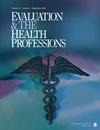The Effectiveness of the StaySafe Intervention Using a Paradigm for Predicting Missing Outcome Data
IF 2.2
3区 医学
Q2 HEALTH CARE SCIENCES & SERVICES
引用次数: 0
Abstract
Sample attrition is a confounding issue in the analysis of data collected in follow-up studies. The present study uses a regression procedure that includes a propensity score as a predictor in estimating imputed data. The utility of the procedure was addressed by comparing results from this augmented data with those from the original data. Data were from a randomized controlled study testing the utility of a tablet-based intervention designed to improve decision-making with respect to health risk behaviors. Outcomes included self-reported testing for HIV, STD, and hepatitis. Two samples were used (163 in community facilities and 348 in residential facilities). Seventy-eight in the community sample and 238 in the residential sample completed follow-up surveys. Propensity scores based on a stepwise logistic regression were used to make the calibration sample and the missing data sample as close as possible. Multilevel analysis was performed for each outcome and multiple imputation compared estimated mean differences for the augmented and original analyses. The model imputing missing data was effective for the three outcomes and increased power. Least square mean differences between augmented and original data appeared to be essentially the same for most of the outcomes. This protocol has been registered with https://www.clinicaltrials.gov/(NCT02777086).使用预测缺失结果数据范式的StaySafe干预的有效性
样本损耗是后续研究中收集的数据分析中的一个混淆问题。本研究使用回归程序,其中包括倾向得分作为估计估算数据的预测因子。通过比较该增强数据的结果与原始数据的结果,解决了该过程的实用性。数据来自一项随机对照研究,该研究测试了基于药片的干预措施的效用,旨在改善有关健康风险行为的决策。结果包括自我报告的艾滋病毒、性病和肝炎检测。使用了两个样本(163个在社区设施,348个在住宅设施)。78名社区样本和238名住宅样本完成了后续调查。使用基于逐步逻辑回归的倾向得分使校准样本与缺失数据样本尽可能接近。对每个结果进行多水平分析,并进行多重输入,比较扩增分析和原始分析的估计平均差异。输入缺失数据的模型对三个结果都是有效的,并且增加了功率。对于大多数结果,增强数据和原始数据之间的最小二乘平均差异似乎基本相同。本协议已在https://www.clinicaltrials.gov/(NCT02777086上注册)。
本文章由计算机程序翻译,如有差异,请以英文原文为准。
求助全文
约1分钟内获得全文
求助全文
来源期刊
CiteScore
5.30
自引率
0.00%
发文量
31
审稿时长
>12 weeks
期刊介绍:
Evaluation & the Health Professions is a peer-reviewed, quarterly journal that provides health-related professionals with state-of-the-art methodological, measurement, and statistical tools for conceptualizing the etiology of health promotion and problems, and developing, implementing, and evaluating health programs, teaching and training services, and products that pertain to a myriad of health dimensions. This journal is a member of the Committee on Publication Ethics (COPE). Average time from submission to first decision: 31 days

 求助内容:
求助内容: 应助结果提醒方式:
应助结果提醒方式:


